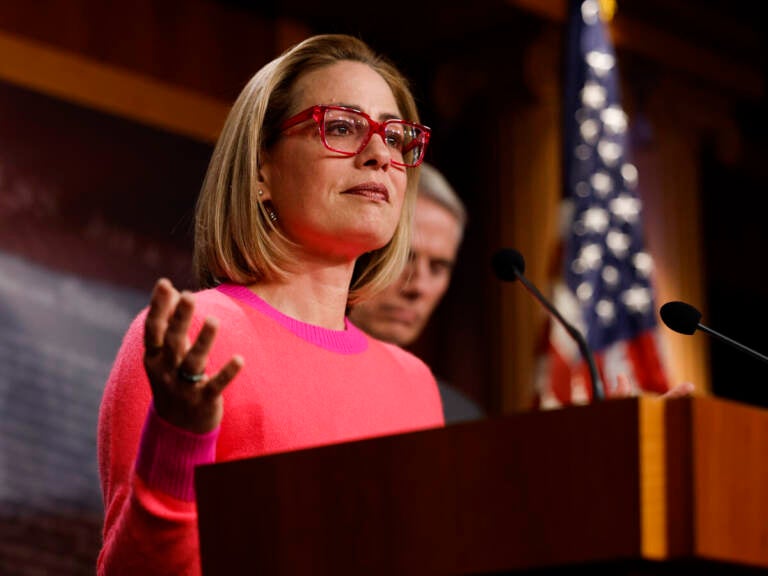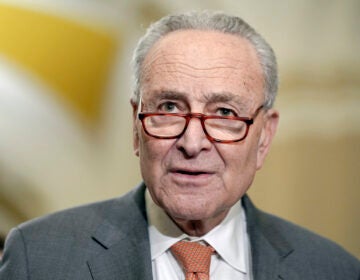Sen. Kyrsten Sinema leaves the Democratic Party to register as an independent

U.S. Sen. Kyrtsen Sinema (AZ) speaks at a news conference. (Anna Moneymaker/Getty Images)
Arizona Sen. Kyrsten Sinema, an unapologetic moderate who has alienated progressives with her stance on the filibuster and other issues, is leaving the Democratic Party to register as an independent.
Sinema announced the news on Friday via Twitter, in an Arizona Republic op-ed and interviews with CNN and Politico.
“In a natural extension of my service since I was first elected to Congress, I have joined the growing numbers of Arizonans who reject party politics by declaring my independence from the broken partisan system in Washington and formally registering as an Arizona Independent,” she tweeted.
Sinema’s move is unlikely to change the power balance in the Senate, as it comes days after Sen. Raphael Warnock won the Georgia runoff election to give Democrats a 51-49 majority. That includes two independents who caucus with them, Sens. Bernie Sanders of Vermont and Angus King of Maine.
Sinema told Politico she will not caucus with Republicans. She also said she won’t attend weekly Democratic Caucus meetings, but rarely does that now. And she wrote in her op-ed that becoming an independent won’t change her work in the Senate, adding that “my service to Arizona remains the same.”
“I’ve never fit neatly into any party box. I’ve never really tried. I don’t want to,” she told CNN. “Removing myself from the partisan structure — not only is it true to who I am and how I operate, I also think it’ll provide a place of belonging for many folks across the state and the country, who also are tired of the partisanship.”
In 2018, Sinema became the first Arizona Democrat elected to the Senate in 30 years, as well as the state’s first-ever female senator and the first openly bisexual senator in U.S. history. She promised to “be an independent voice for all Arizonans.”
But Sinema’s bipartisan approach to legislating had alienated many of her Democratic colleagues and constituents, particularly over the last two years, in an evenly divided Senate where any one vote could influence or derail a bill (even with the House and White House under Democratic control).
Over the last two years, she and fellow moderate Democratic Sen. Joe Machin of West Virginia have been criticized as standing in the way of President Biden’s agenda by regularly holding up or objecting to parts of key legislation, as was the case with Democrats’ key budget package.
“My approach is rare in Washington and has upset partisans in both parties,” she acknowledged in Friday’s op-ed. “It is also an approach that has delivered lasting results for Arizona.”
Sinema pointed to her work with colleagues on both sides of the aisle to pass legislation related to critical infrastructure, economic competitiveness, water issues, veterans’ benefits, marriage access for LGTBQ Americans and gun safety, among other issues.
And she named several areas in which her position and priorities remain steadfast — for example, that “a woman’s health care decision should be between her, her doctor and her family” and her work to “secure the southern border, ensure fair and humane treatment for migrants and permanently protect ‘Dreamers.’
But she also wrote about what she won’t do.
“If anyone previously supported me because they believed, contrary to my promise, that I would be a blindly loyal vote for a partisan agenda – or for those who believe our state should be represented by partisans who push divisive, negative politics, regardless of the impact on our state – then there are sure to be others vying for your support,” she added.
Sinema is up for reelection in 2024. She declined to discuss pursuing a second Senate term, telling Politico, “It’s fair to say that I’m not talking about it right now.”
9(MDAzMzI1ODY3MDEyMzkzOTE3NjIxNDg3MQ001))




